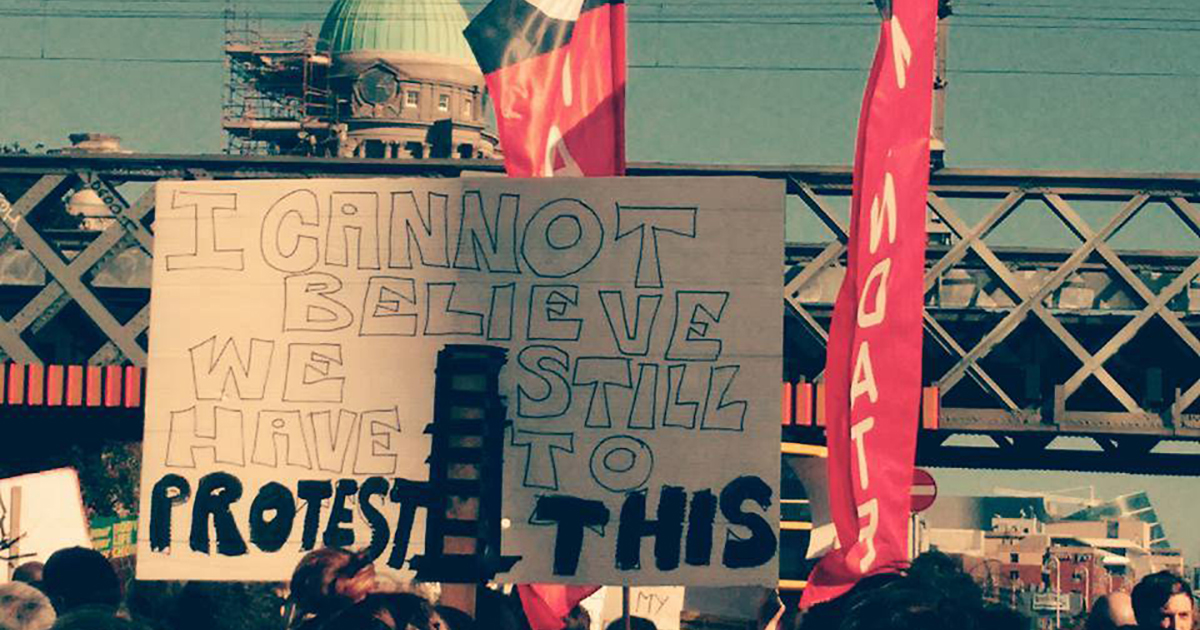ROAR
★ ★ ★ ★
THE PAST THAT HAUNTS IRELAND’S WOMEN

By Lorna O’Hara
The spectre of Catholic guilt still looms over Ireland and this still has a clear influence over attitudes towards women. Of course, the whole world is rife with sexism—after all, we live in a patriarchal society. You can’t escape it, even if you try. When I came to Berlin, I had this illusion that things were more equal and progressive in Germany, but after long conversations with many different feminist activists, as well as seeing the proceedings of the Gina Lisa Lohfink rape case, I was quickly rid of this illusion. It appears that every country still needs to find women to blame; that we are guilty until proven innocent for everything that we do, or indeed, everything that is done to us.
But I still feel there’s something peculiar about Ireland, something deep in our subconscious, compounded by years of Catholic instruction in school. Obviously this was more present for people from older generations than mine, but the feeling still lingers, and so do the attitudes that come with it. We all know that in Catholicism (as with most religions) women are the shameful sexual beings, luring men to sin. After all, it was this kind of mind-set that was behind one of Ireland’s most disturbing institutions: the Magdalene laundries.
If you haven’t already heard about these infamous laundries, they were church-run institutions (that existed worldwide) where young unmarried women were often sent when they became pregnant. These women were sent to carry out unpaid labour in conditions that were often worse than that of prisons and were branded as “fallen women”; ostracised, abused and shunned by society. These institutions were part of Irish society from as early as the 18th century until the final laundry on Sean Mac Dermott Street closed its doors in 1996, at the beginning of Ireland’s “Celtic Tiger” era, a time when Ireland was supposedly stepping into a more modern age. These women were sent there not only by the Catholic Church or the state (which were pretty much one in the same), but often by family members who couldn’t bear the “shame” of a daughter or sister committing such a grievous sin. One would wonder if these women had somehow become pregnant all by themselves, because no one seemed to ask where the men were in all of this.
Despite the apologies and recognition of abuse, some of the religious orders in charge of the laundries still refer to them as having been “places of refuge” for women who had nowhere else to turn to. It’s laughable that these cesspits of institutional abuse could ever be considered a sanctuary, but the question remains: why did they need refuge in the first place? And that’s where the problem lies.
We have to accept the fact that those laundries survived with the complicity of ordinary Irish people and their willingness to buy into the narrative of the “fallen woman”. It was easier to believe that there was something wrong with these women, that they were impure and that they needed to be locked away and hidden, lest they contaminate the rest of the good pure Catholics, including the good pure Catholic men who had gotten them pregnant in the first place.
This idea that it’s always the woman’s fault and that she needs to be punished somehow endures to this very day, and is confirmed again and again by the forces shaping society: from politics to the media. Recently we had a radio presenter George Hook make disgusting comments about the rape of a young girl, essentially blaming her because she was apparently known for her “promiscuity”. He fumbled over what made this girl somehow “different”, what was it about her that got her raped—as if it was some profound psychological question about that girl’s character. He essentially proposed that this girl was somehow different from the daughter that “stays halfway sober and gets home safe”. It was something about her and what she did that led to this terrible situation. What a disturbing and genuinely dangerous attitude to be held by someone with cultural clout in this day and age. And what’s worse is that women who have been sexually abused or raped had to sit by and listen to this idiot confirm their worst fears: that no one believes them and that what they have experienced is no one’s fault but their own.
When a woman is raped, the focus almost always lies on her actions, what she must have done to deserve it: what she wore or how much she drank. While sentencing for rape has increased in Ireland to an average of ten years, it’s still four years less than the sentence a woman faces if she’s found to have taken the abortion pill.
If a man rapes a woman, judges seem all too ready to empathise or find some sort of “understandable” explanation as to why he did it or some redeeming quality that made it forgivable. In 2014 millionaire Anthony Lyons got a mere 6-month sentence for sexual assault while his mix of alcohol and cholesterol medications took the blame. And in 2015 Magnus Meyer Hustveit received a suspended sentence for repeatedly raping his girlfriend, his “honesty” in confessing the crime earning him some degree of clemency. And yet if a woman needs an abortion her behaviour seems to be open to more scrutiny than that of an actual criminal.
We always seem to be ready to forgive men and blame women; this is why you won’t find anti-choicers leading anti-rape campaigns or donating to the local rape crisis centres, but you might find them parking an anti-abortion advert outside one, in an attempt to shame women. We can clearly see that the archetype of the fallen woman has not gone away in Ireland, or indeed in many countries. It is something which has been drilled into us all. Even when you free yourself of the teachings of the Catholic church and develop a healthy attitude towards sex, we still find examples everywhere in mainstream Irish society that confirm the old belief that women are responsible and to blame for everything that happens to them.
We might be tempted to close the book on the Magdalene laundries and chalk it up to being solely a problem of the past, but the misogynistic attitudes that led to their foundation still haunt Irish society today.

Lorna O’Hara is a doctoral student and feminist activist currently living between Berlin and Dublin. Her writing and research focuses on feminist activism and art, in particular similarities/differences between international feminist groups and artistic projects that have a focus on increasing awareness about/changing violence against women and the control of women’s bodies.

DEAR READER
At The Wild Word we are proud to present some of the best online writing around, as well as being a platform for new and emerging writers and artists.
As a non-profit, the entire site is a labour of love.
If you have read the work in The Wild Word and like what we do, please put something in our tip jar to keep this amazing platform alive.
THANK YOU FOR YOUR SUPPORT!























